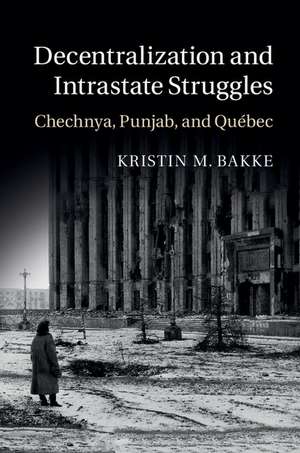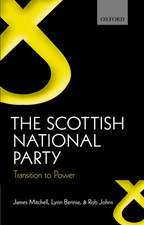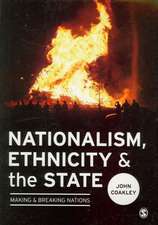Decentralization and Intrastate Struggles: Chechnya, Punjab, and Québec
Autor Kristin M. Bakkeen Limba Engleză Hardback – 3 iun 2015
Preț: 719.16 lei
Preț vechi: 836.23 lei
-14% Nou
Puncte Express: 1079
Preț estimativ în valută:
137.73€ • 141.90$ • 115.38£
137.73€ • 141.90$ • 115.38£
Carte tipărită la comandă
Livrare economică 24 februarie-10 martie
Preluare comenzi: 021 569.72.76
Specificații
ISBN-13: 9781107094383
ISBN-10: 1107094380
Pagini: 338
Ilustrații: 9 b/w illus. 8 maps 11 tables
Dimensiuni: 160 x 236 x 28 mm
Greutate: 0.66 kg
Editura: Cambridge University Press
Colecția Cambridge University Press
Locul publicării:New York, United States
ISBN-10: 1107094380
Pagini: 338
Ilustrații: 9 b/w illus. 8 maps 11 tables
Dimensiuni: 160 x 236 x 28 mm
Greutate: 0.66 kg
Editura: Cambridge University Press
Colecția Cambridge University Press
Locul publicării:New York, United States
Cuprins
1. 'Peace-preserving' decentralization?; 2. Divisions, diversity, and disparity in federal states; 3. The First War in Chechnya; 4. The rise and decline of the Punjab crisis; 5. Québec's sovereignty movement; 6. Decentralization and restoring peace after war.
Recenzii
'Kristin M. Bakke has produced the best and most systematic study to date on how decentralization can impact prospects for peace and stability in countries facing separatist threats. Challenging prominent preexisting approaches, this book treats decentralization not as a single act that then generates one outcome or another, but instead as the institutionalization of a certain set of processes that shape relationships between center and periphery. The impact of decentralization is thus neither uniformly positive nor negative but depends crucially on context, in particular the nature of the identity divides facing the country and patterns of wealth distribution across and within regions. … Decentralization and Intrastate Struggles will be important for anyone who is interested in federalism, ethnic conflict, and post-conflict settlement.' Henry Hale, George Washington University
'For decades, both scholars and policy makers have debated the advantages and disadvantages of decentralization in maintaining peace in divided societies; but with little resolution about when it might be desirable. Until now. … Bakke weaves together a compelling set of arguments, statistical analysis, and deeply researched case studies of Chechnya, Punjab, and Quebec to reduce a potentially bewildering array of plausible explanatory factors to the interactions of just a few: the interplay between states and regions, and autonomy and societal traits. The result is a satisfying and useful general explanation unpacking the conditions under which decentralization is war-provoking or peace-preserving.' Monica Duffy Toft, Blavatnik School of Government, University of Oxford
'For decades, both scholars and policy makers have debated the advantages and disadvantages of decentralization in maintaining peace in divided societies; but with little resolution about when it might be desirable. Until now. … Bakke weaves together a compelling set of arguments, statistical analysis, and deeply researched case studies of Chechnya, Punjab, and Quebec to reduce a potentially bewildering array of plausible explanatory factors to the interactions of just a few: the interplay between states and regions, and autonomy and societal traits. The result is a satisfying and useful general explanation unpacking the conditions under which decentralization is war-provoking or peace-preserving.' Monica Duffy Toft, Blavatnik School of Government, University of Oxford
Notă biografică
Descriere
Decentralization may help preserve peace in one country or in one region, but may have the opposite effect in others.













